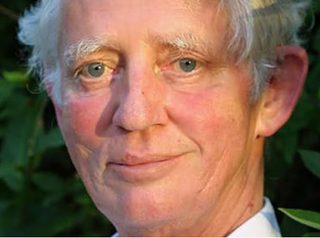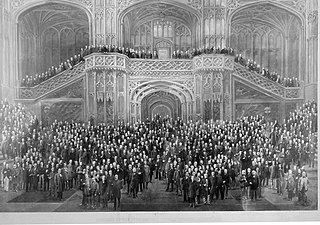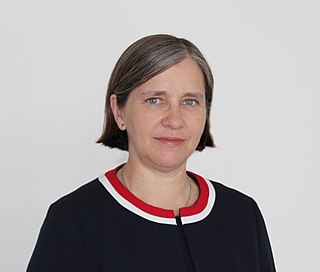Related Research Articles

Sir Edward Mellanby was a British biochemist and nutritionist who discovered vitamin D and its role in preventing rickets in 1919.

Vulimiri Ramalingaswami was an Indian medical scientist, pathologist and medical writer. His pioneering research on nutrition got him elected to the National Academy of Sciences, Russian Academy of Medical Sciences and the Royal Society of London.
Geoffrey Howard Bourne was an Australian-American anatomist and primatologist. In particular, he studied the adrenal gland, conducting pioneering work in histochemistry.

Alfred (Al) Sommer is a prominent American ophthalmologist and epidemiologist at the Johns Hopkins Bloomberg School of Public Health. His research on vitamin A in the 1970s and 1980s revealed that dosing even mildly vitamin A deficient children with an inexpensive, large dose vitamin A capsule twice a year reduces child mortality by as much as 34 percent. The World Bank and the Copenhagen Consensus list vitamin A supplementation as one of the most cost-effective health interventions in the world.
Aleck William Bourne was a prominent British gynaecologist and writer, known for his 1938 trial, a landmark case, in which he asked to be arrested for performing a termination of pregnancy on a 14-year-old rape victim. He was subsequently charged with procuring an illegal abortion but was acquitted. He later became an anti-abortion activist.
The Gruppo Italiano per lo Studio della Sopravvivenza nell'Infarto Miocardico (GISSI) is a cardiology research group founded as a collaboration between two Italian organisations – the Mario Negri Institute for Pharmacological Research and the Associazione Nazionale dei Medici Cardiologi Ospedalieri (ANMCO).

John Yudkin FRSC was a British physiologist and nutritionist, and the founding Professor of the Department of Nutrition at Queen Elizabeth College, London.
Frederick Wabwire-Mangen is a Ugandan physician, public health specialist and medical researcher. Currently he is Professor of Epidemiology and Head of Department of Epidemiology & Biostatistics at Makerere University School of Public Health. Wabwire-Mangen also serves as the Chairman of Council of Kampala International University and a founding member of Accordia Global Health Foundation’s Academic Alliance
David M. Serwadda is a Ugandan physician, medical researcher, academic, public health specialist and medical administrator. Currently he is a Professor of Public Health at Makerere University School of Public Health, one of the schools of Makerere University College of Health Sciences, a semi-autonomous constituent college of Makerere University, the oldest university in Uganda. Serwadda is also a founding member of Accordia Global Health Foundation's Academic Alliance.

Sir Andrew Paul Haines, FMedSci is a British epidemiologist and academic. He was the Director of the London School of Hygiene & Tropical Medicine from 2001 to 2010.
Himmatrao Saluba Bawaskar is an Indian physician from Mahad, Maharashtra. He is known for his research on treatment for scorpion stings. Much of his work has been published in the British medical journal The Lancet. He has also conducted research in the fields of snake bites, cardiovascular diseases, and hypothyroidism.

Zhu Jiming, better known in English as Chi-Ming Chu, was a Chinese virologist. He was a member of the Chinese Academy of Science and an Honorary Member of the American Society for Microbiology.

Otto Herbert Wolff, was a German born medical scientist, paediatrician and was the Nuffield Professor of Child Health at Great Ormond Street Hospital. Wolff was notable for being one of the first paediatricians in Britain to set up a clinic for obese children. Later research into plasma lipids with Harold Salt pioneered the techniques of lipoprotein electrophoresis. He later conducted research into the role of lipid disturbance in childhood as a precursor of coronary artery disease and his recognition in 1960 of the rare condition of abetalipoproteinaemia. Wolff was also co-discoverer of the Edwards syndrome in abnormal chromosomes.

Thomas Martin Barratt was a British paediatrician and professor of paediatric nephrology. Barratt was most notable for developing a specialist service for children with kidney diseases in Britain, bringing peritoneal dialysis, haemodialysis, and later renal transplantation to ever younger children. Barratt was an early advocate for multidisciplinary care and developed a model that was later taken up by many other specialist centres across the world. His research led to a new treatments for many types of childhood kidney diseases., and for research into childhood Nephrotic syndrome and Hemolytic-uremic syndrome.

Child development in India is the Indian experience of biological, psychological, and emotional changes which children experience as they grow into adults. Child development has a significant influence on personal health and, at a national level, the health of people in India.

The Vaccine Confidence Project (VCP) founded in 2010 by Heidi Larson, was developed in response to hesitancy and misinformation on vaccination programmes such as those that caused a boycott of polio eradication efforts in Northern Nigeria in 2003–04. It is an early warning system to identify and evaluate public confidence in vaccines, with the purpose of tackling the problem early, when it is likely to be manageable.

The International Medical Congress was a series of international scientific conferences on medicine that took place, periodically, from 1867 until 1913.

Lucy Chappell is a British professor of obstetrics at King’s College London and the Chief Scientific Adviser (CSA) for the UK Department of Health and Social Care. As part of her CSA role, she oversees the National Institute for Health and Care Research (NIHR) as Chief Executive Officer. Her research areas include medical problems during pregnancy such as pre-eclampsia, and the safety of medicines in pregnancy.
Charles Cady Ungley (14 July 1902, London – 21 August 1958, Newcastle upon Tyne) was an English physician and medical researcher, known for his research on the therapeutic uses of vitamin B12. In 1938 he was the Goulstonian Lecturer.
Elaine Margaret Dennison is a British epidemiologist and rheumatologist, and is Professor of Clinical Research at Victoria University of Wellington, and Professor of Musculoskeletal Epidemiology and Honorary Consultant in Rheumatology within Medicine at the University of Southampton. Dennison specialises in musculoskeletal ageing, and she is particularly interested in how early life impacts on conditions such as osteoarthritis and osteoporosis later in life.
References
- 1 2 Paul, Alison A. (1987). "60 years of research at the Dunn Nutrition Unit". Nutrition Bulletin. 12 (2): 116–121. doi:10.1111/j.1467-3010.1987.tb00029.x. ISSN 1467-3010.
- 1 2 British Medical Journal Publishing Group (1973-07-07). "Obituary Notices". Br Med J. 3 (5870): 54–55. doi:10.1136/bmj.3.5870.54. ISSN 0007-1447. PMID 4577723. S2CID 220198667.
- 1 2 "Dr Leslie Julius Harris | The Nutrition Society". www.nutritionsociety.org. Retrieved 2020-09-27.
- 1 2 Harris, Leslie J; Ray, S. N. (1935-01-12). "Diagnosis of Vitamin-C Subnutrition by Urine Analysis". The Lancet. 225 (5811): 71–77. doi:10.1016/S0140-6736(01)29147-8. ISSN 0140-6736.
- 1 2 Harris, Leslie J; Moore, Thomas (1928-10-27). "" Hypervitaminosis " and " Vitamin Balance."". The Lancet. Originally published as Volume 2, Issue 5487. 212 (5487): 892–893. doi:10.1016/S0140-6736(00)43521-X. ISSN 0140-6736.
- ↑ Harris, Leslie J; Abbasy, M. A. (1937-12-18). "Nutrition Surveys a Simplified Procedure for the Vitamin-C Urine Test". The Lancet. 230 (5964): 1429. doi:10.1016/S0140-6736(00)91891-9. ISSN 0140-6736.
- 1 2 Harris, Leslie J (1942-05-30). "Vitamin-C Levels of School-Children and Students in War-Time". The Lancet. 239 (6196): 642–644. doi:10.1016/S0140-6736(00)70177-2. ISSN 0140-6736.
- ↑ Harris, L. J.; Kodicek, E. (June 1946). "The Vitamin B Complex: Introductory Survey". Proceedings of the Nutrition Society. 4 (2): 81–92. doi: 10.1079/PNS19460021 . ISSN 1475-2719. PMID 20988395.
- ↑ Harris, Leslie J. (January 1937). VITAMINS IN THEORY & PRACTICE. Cambridge.